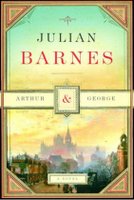Arthur & George by Julian Barnes

I found long stretches of this book tedious. I loved the beginning, where Barnes alternates short spurts on the lives of Arthur and George. It’s interesting, fast moving and well written. I’m intrigued that he’s taken real characters and a real interaction between them and researched it thoroughly as background for a work of the imagination.
As he switches from one to the other outlining their early lives, Barnes begins to paint the picture of the Edwardian world that is the book’s greatest achievement I think. Then the focus switches to George and follows his arrest, trial, conviction and imprisonment for crimes the readers never even considers he might have committed. I found it painful to read, at least in part because the outcome was so obvious right from the beginning, but also because there’s no way it can be suspenseful—what one expects of a mystery/crime story. There follows the story of Arthur’s chaste love affair with Jean during his wife’s illness and his involvement, shortly after his wife’s death, in efforts to prove that George—who has contacted him in desperation—is entirely innocent and deserves public exoneration and compensation. Again the novel gets boring, partly because it’s clear that Conan Doyle will be only partly successful in his attempt to exonerate George—i.e., in proving that George couldn’t have done it but that someone else did.
Part of the frustration I felt, though, was, I’m sure, intended by Barnes. We all read mystery books these days and watch detectives and trials on film and TV and so we bristle when it’s obvious that nothing is proved by the “evidence” used to convict George. We’re also well aware of racial prejudice and see how racial stereotyping works to satisfy the in-group and punish the out-group so we’re surprised that George doesn’t believe his persecution and ultimate conviction have anything to do with racism. We think Arthur is surely right about that, even though we’re likely to agree with George that Arthur’s “case” is as flawed as is the Staffordshire Constabulary’s. At that point the book gets interesting again, as George critiques the case brought by Conan Doyle. The creator of Sherlock Holmes is hardly a brilliant detective in real life—nor should he be necessarily.
I found the information about Conan Doyle’s Spiritualism in his later life interesting and in some ways the Epilogue was the most suspenseful part of the book, so that after being bored for many many pages, I really hated to see the book end.
I have not read anything else by Barnes, but considering his reputation for fiction, I’m assuming this is not one of his best. Still, what I take away from the reading is the really very believable recreation of the period—with all its warts as well as with its details meticulously researched. I was curious that two British reviewers focused on that recreation of time and place and then noted the book cover, got up to look like an old book. However, I’ve only seen that cover on the Internet—the cover of the American edition signals a book that takes place 100 years ago, but doesn’t remotely look like a book of that pe

0 Comments:
Post a Comment
<< Home